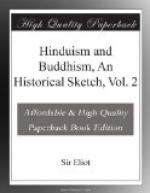As indicated above the so-called books of Sruti or Vedic literature are not consecutive treatises, but rather responsa prudentium, utterances respecting ritual and theology ascribed to poets, sacrificers and philosophers who were accepted as authorities. When these works came to be regarded as an orderly revelation, even orthodoxy could not shut its eyes to their divergences, and a comprehensive exegesis became necessary to give a conspectus of the whole body of truth. This investigation of the meaning of the Veda as a connected whole is called Mimamsa, and is divided into two branches, the earlier (purva) and the later (uttara). The first is represented by the Purva-mimamsa-sutras of Jaimini[771] which are called earlier (purva) not in the chronological sense but because they deal with rites which come before knowledge, as a preparatory stage. It is interesting to find that Jaimini was accused of atheism and defended by Kumarila Bhatta. The defence is probably just, for Jaimini does not so much deny God as ignore him. But what is truly extraordinary, though characteristic of much Indian literature about ritual, is that a work dealing with the general theory of religious worship should treat the deity as an irrelevant topic. The Purva-mimamsa discusses ceremonies prescribed by an eternal self-existing Veda. The reward of sacrifice is not given by God. When the result of an act does not appear at once, Jaimini teaches that there is all the same produced a supersensuous principle called apurva, which bears fruit at a later time, and thus a sacrifice leads the offerer to heaven. This theory is really tantamount to placing magic on a philosophic basis.
Badarayana’s sutras, which represent the other branch of the Mimamsa, show a type of thought more advanced and profound than Jaimini’s. They consist of 555 aphorisms—less than a fifth of Jaimini’s voluminous work—and represent the outcome of considerable discussion posterior to the Upanishads, for they cite the opinions of seven other teachers and also refer to Badarayana himself by name. Hence they may be a compendium of his teaching made by his pupils. Their date is unknown but Sankara evidently regards them as ancient and there were several commentators before him.[772] Like most sutras these aphorisms are often obscure and are hardly intended to be more than a mnemotechnic summary of the doctrine, to be supplemented by oral instruction or a commentary. Hence it is difficult to define the teaching of Badarayana as distinguished from that of the Upanishads on the one hand, and that of his commentators on the other, or to say exactly what stage he marks in the development of thought, except that it is the stage of attempted synthesis.[773] He teaches that Brahman is the origin of the world and that with him should all knowledge, religion and effort be concerned. By meditation on him, the soul is released and somehow associated with him. But it is not clear that we have any warrant for finding




